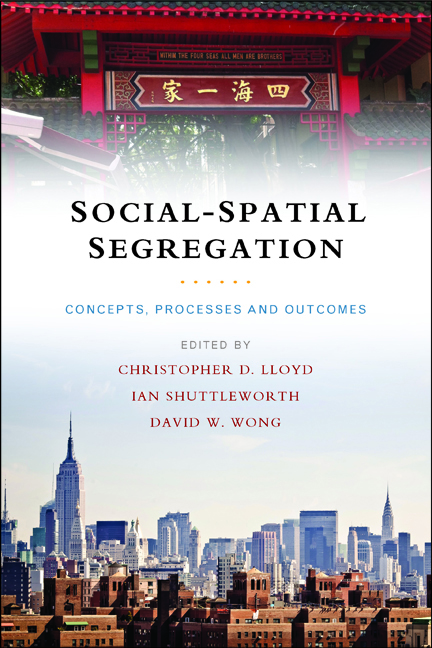eight - The international comparability of ethnicity and collective identity: implications for segregation studies
Published online by Cambridge University Press: 04 March 2022
Summary
Introduction
This book is devoted to the various factors that have recently brought urban segregation to the fore of contemporary public debates in most developed countries. However, despite a worldwide increase in interest in the study of ethnic, racial and migrant segregation, there is a clear lack of international comparative studies in this area. In other words, research that assesses the level of segregation between cities and consistent population groups across countries is almost non-existent. One of the consequences of this is a lack of agreed standards to conduct studies of socio-spatial differences as well as to benchmark results beyond entrenched national conceptions and meanings of ‘otherness’ and disadvantage. This situation, in turn, impedes the justification of segregation as a subject worth investigating, since many academic arguments at national level tend to be frequently shaped by the political and media representations and priorities of the moment, and as such, are often immune to robust long-term and international validation.
Such a state of affairs is largely a consequence of the serious methodological barriers faced by scholars in this area, as discussed by other authors in this book. These are derived from a strong dependence on the information provided by national Censuses of Population (Kertzer and Arel, 2002; Logan and Zhang, 2004; see also Chapter One, this volume). As such, different issues arise from the use of inconsistent units of analysis between countries, or even within countries when making comparisons over time (Mateos et al, 2009). The majority of the literature in this area focuses on the problems related to the comparison between incompatible geographical units of analysis, namely, issues of scale and extent of urban areas (Johnston et al, 2007; see also Chapter Two, this volume). The former refers to variations in the number and size of the basic spatial units of residence (that is, defining the meaningful scale of a ‘neighbourhood’; see Krupka, 2007; see also Chapter Four, this volume), while the latter relates to the problem of delineating the external boundary of what we consider ‘a self-contained city’ or metropolitan area.
However, a key aspect that seems to be overlooked in segregation debates is the issue of varying definitions, measurements and meanings of the categorisation of human groups underpinning each investigation (Phillips, 2007).
- Type
- Chapter
- Information
- Social-Spatial SegregationConcepts, Processes and Outcomes, pp. 163 - 194Publisher: Bristol University PressPrint publication year: 2014



